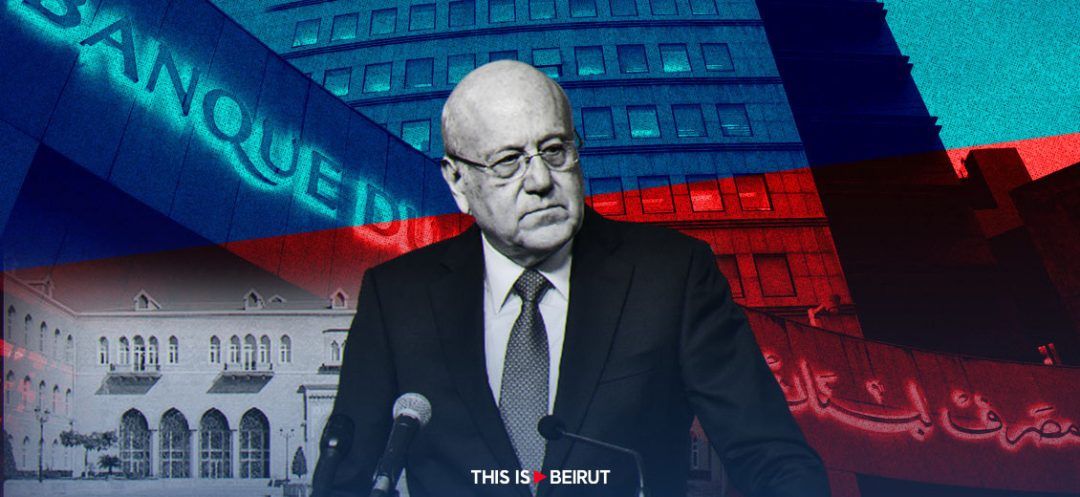
The Council of State's decision to invalidate the article related to the suppression of a significant portion of the state's foreign currency commitments to the Central Bank of Lebanon (BDL), as outlined in the government's economic recovery plan dated 20/5/2022, brings some relief to depositors and bankers. However, questions concerning the timing and method of deposit recovery remain “recurrent” and “legitimate.”
A Chinese philosopher once said, “A journey of a thousand miles always begins with a single step.” This is precisely what Caretaker Prime Minister Najib Mikati did by endorsing the conclusions of the Council of State's decision, less than 48 hours after its publication last Tuesday.
The Council of State had accepted, both in form and in content, an appeal filed by the Association of Banks in Lebanon (ABL) against an article within the government's recovery plan. This particular article aimed to suppress the currency commitments of the Central Bank of Lebanon towards Lebanese banks. The direct consequence of this measure would have been the elimination of bank deposits and the collapse of the sector.
Najib Mikati, therefore, abided by the authority of law, acknowledging that the decision of the administrative jurisdiction binds the Executive power. It applies to all parties and holds the authority of res judicata.
In its judgment, the Council of State considered the article concerning the suppression of financial commitments from the BDL to the banks as a breach of provisions within the Lebanese Constitution and a series of laws in force, including the Currency and Credit Code, which regulates, among other aspects, the relationship between the BDL and the banks. Consequently, this decision reaffirmed the “sacred” nature of deposits, as enshrined in the Constitution under the chapter on private property.
Spent Funds
The Prime Minister in the caretaker government acknowledged during a meeting with economic journalists on Wednesday that “bank deposits amounting to $140 billion have vanished, with the state bearing full responsibility.”
The statements of Akram Azouri, the lawyer representing ABL, who indicated that “the funds borrowed by the state from the BDL have been spent,” were more nuanced, a fact emphasized in the forensic audit report conducted by consultant Alvarez & Marsal.
It is thus clear that the provisions of the Council of State's judgment do not produce immediate effects, but rather pave the way for a step towards crisis resolution.
The 2019 Crisis
The events of the fourth quarter of 2019 represented a “systemic” crisis that hit several sectors hard, particularly the banking industry. The latter encountered a liquidity crisis unparalleled in its history. In other words, the crisis that erupted in October 2019 was a latent, long-lasting crisis.
Gradual Constitution
With the principle of the state's debt to the BDL principle now firmly established and confirmed, the reconstitution and gradual restitution of deposits naturally ensue. That being said, the collateral damages incurred by depositors during the systemic crisis cannot be undone. The timeline determination depends on the specifics to be set by the pace of the state's asset recovery.
A Corrupt System
Given the prevailing circumstances of widespread corruption in Lebanon, restructuring banks proves ineffective, as practically all institutions have depleted their capital reserves. Simultaneously, any injection of liquidity from current bank shareholders or foreign financial entities is not feasible.
In principle, the state, with all its components, should halt the interference with the BDL and reclaim control over airport infrastructure, enabling the banking sector to rebuild its strength, founded on trust.
It was this trust that had positioned Lebanese banks as the pride of the banking sector in the Middle East.
A default in payment may occur, but it should only happen in an organized manner, which was not the case under Hassan Diab's government.
Next week, the Association of Banks in Lebanon (ABL) will replace the BDL in the context of an appeal before the administrative jurisdiction to compel the state to repay its debt.
This appeal is part of a collective action initiated two months ago by eleven Lebanese banks to address the damages they incurred as lenders to the BDL, since the BDL has not requested repayment from the state for the amounts it had loaned.
Read more




Comments